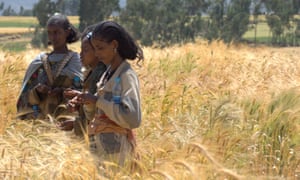https://www.theguardian.com/environment/2017/sep/26/sixth-mass-extinction-of-wildlife-also-threatens-global-food-supplies
The sixth mass extinction of global wildlife already under way is seriously threatening the world’s food supplies, according to experts.
“Huge proportions of the plant and animal species that form the foundation of our food supply are just as endangered [as wildlife] and are getting almost no attention,” said Ann Tutwiler, director general of Bioversity International, a research group that published a new report on Tuesday.
“If there is one thing we cannot allow to become extinct, it is the species that provide the food that sustains each and every one of the seven billion people on our planet,” she said in an article for the Guardian. “This ‘agrobiodiversity’ is a precious resource that we are losing, and yet it can also help solve or mitigate many challenges the world is facing. It has a critical yet overlooked role in helping us improve global nutrition, reduce our impact on the environment and adapt to climate change.”
Three-quarters of the world’s food today comes from just 12 crops and five animal species and this leaves supplies very vulnerable to disease and pests that can sweep through large areas of monocultures, as happened in the Irish potato famine when a million people starved to death. Reliance on only a few strains also means the world’s fast changing climate will cut yields just as the demand from a growing global population is rising.
There are tens of thousands of wild or rarely cultivated species that could provide a richly varied range of nutritious foods, resistant to disease and tolerant of the changing environment. But the destruction of wild areas, pollution and overhunting has started a mass extinction of species on Earth. The focus to date has been on wild animals – half of which have been lost in the last 40 years – but the new report reveals that the same pressures are endangering humanity’s food supply, with at least 1,000 cultivated species already endangered.
Tutwiler said saving the world’s agrobiodiversity is also vital in tackling the number one cause of human death and disability in the world – poor diet, which includes both too much and too little food. “We are not winning the battle against obesity and undernutrition,” she said. “Poor diets are in large part because we have very unified diets based on a narrow set of commodities and we are not consuming enough diversity.”
The new report sets out how both governments and companies can protect, enhance and use the huge variety of little-known food crops. It highlights examples including the gac, a fiery red fruit from Vietnam, and the orange-fleshed Asupina banana. Both have extremely high levels of beta-carotene that the body converts to vitamin A and could help the many millions of people suffering deficiency of that vitamin.
Quinoa has become popular in some rich nations but only a few of the thousands of varieties native to South America are cultivated. The report shows how support has enabled farmers in Peru to grow a tough, nutritious variety that will protect them from future diseases or extreme weather.
Mainstream crops can also benefit from diversity and earlier in 2017 in Ethiopia researchers found two varieties of durum wheat that produce excellent yields even in dry areas. Fish diversity is also very valuable, with a local Bangladeshi species now shown to be extremely nutritious.
“Food biodiversity is full of superfoods but perhaps even more important is the fact these foods are also readily available and adapted to local farming conditions,” said Tutwiler.
Bioversity International is working with both companies and governments to ramp up investment in agrobiodiversity. The supermarket Sainsbury’s is one, and its head of agriculture, Beth Hart, said: “The world is changing – global warming, extreme weather and volatile prices are making it harder for farmers and growers to produce the foods our customers love. Which is why we are committed to working with our suppliers, farmers and growers around the world to optimise the health benefits, address the impact and biodiversity of these products and secure a sustainable supply.”
Pierfrancesco Sacco, Italy’s permanent representative to the UN’s Food and Agriculture Organisation, said: “The latest OECD report rates Italy third lowest in the world for levels of obesity after Japan and Korea. Is it a coincidence that all three countries have long traditions of healthy diets based on local food biodiversity, short food supply chains and celebration of local varieties and dishes?”
He said finding and cultivating a wider range of food is the key: “Unlike conserving pandas or rhinos, the more you use agrobiodiversity and the more you eat it, the better you conserve it.”
Since you’re here …
… we have a small favour to ask. More people are reading the Guardian than ever but advertising revenues across the media are falling fast. And unlike many news organisations, we haven’t put up a paywall – we want to keep our journalism as open as we can. So you can see why we need to ask for your help. The Guardian’s independent, investigative journalism takes a lot of time, money and hard work to produce. But we do it because we believe our perspective matters – because it might well be your perspective, too.
I appreciate there not being a paywall: it is more democratic for the media to be available for all and not a commodity to be purchased by a few. I’m happy to make a contribution so others with less means still have access to information.Thomasine F-R.
If everyone who reads our reporting, who likes it, helps to support it, our future would be much more secure.

沒有留言:
張貼留言